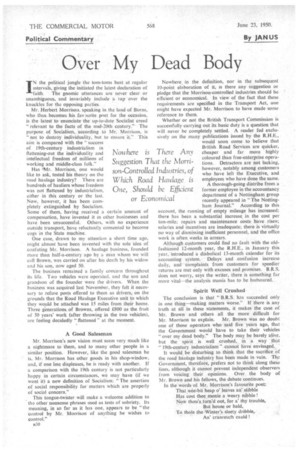Over My Dead Body
Page 36

If you've noticed an error in this article please click here to report it so we can fix it.
By JAN US
IN the political jungle the tom-toms beat at regular intervals, giving the initiated the latest declaration of faith. The gnomic utterances are never clear or unambiguous, and invariably include a rap over the
knuckles for the opposing parties. . .
Mr. Herbert Morrison. speaking in the land of Burns, who thus.. becomes his fav3urite poet for the occasion, is the latest to enunciate the up-to-date Socialist creed "'relevant to the facts of the mid-20th century." The purpose of Socialism, according to Mr. Morrison, is " not to destroy individuality, hilt to insure it." This aim is compared with the ' success of 19th-century industrialism in flattening-out the individuality and intellectual freedom of millions of working and middle-class folk."
Has IVIr. Morrison, one would like to ask, tested his theory on the road haulage industry? There are hundreds of hauliers whose freedom was not flattened by industrialism, either in this century or the last. Now, however, it has been completely extinguished by Socialism. Some of them, having received a certain amount of compensation, have invested it in other businesses and have been unsuccessful. Others, with no experience outside transport, have reluctantly consented to become cogs in the State machine.
One case, drawn to my attention a short time ago, might almost have been invented with the sole idea of confuting Mr. Morrison. A haulage business, founded more than half-a-century ago by a man whom we will call Brown, was carried on after his death by his widow and his son, now aged 50.
The business remained a family concern throughout its life. Two vehicles were operated, and the son and grandson of the founder were the drivers. When the business was acquired last November, they felt it necessary to refuse posts offered to them as drivers, on the grounds that the Road Haulage Executive unit to which they would be attached was 15 miles from their home. Three generations, of Browns, offered BOO as the fruit of 50 years' work (after throwing in the two vehicles), are feeling decidedly " flattened" at the moment.
A Good Salesman Mr. Morrison's new vision must seem very much like a nightmare to them, and to many other people in a similar position. However, like the good salesman he is. Mr. Morrison has other goods in his shop-window', and, if one line displeases, he is ready with another. If a comparison with the 19th century is not particularly happy in certain circumstances, we may have (if we want it) a new definition of "The assertion of social responsibility for matters which are properly of social concern."
This tongue-twister will make a welcome addition to the other nonsense phrases used as tests of sobriety. its meaning, in so far as it has one, appears to be "the control by Mr. 'Morrison of anything he wishes to control."
530
Nowhere. in the definition, nor in the subsequent 10-point elaboration of it, is there any suggestion or pledge that the Morrison-controlled industries should be efficient or economical. In view of the fact that these requirements are specified in the Transport Act, one might have expected Mr. Morrison to have made some reference to them.
Whether or not the British Transport Commission is successfully carrying out its basic duty is a question that will never be completely settled. A reader fed exclusively on the many publications issued by the R.H.E., would soon come to believe that British Road Services are quicker, cheaper and far more highly coloured than free-enterprise operations. Detractors are not lacking, however, notably among customers who have left the Executive, and employees who have done the same.
A thorough-going diatribe from a former employee in the accountancy department of a Nottingham group recently appeared in "The Nottingham Journal." According to this account, the running of empty mileage has increased; there has been a substantial increase, in the cost per ton-mile; repairs and maintenance costs have risen; salaries and incentives are inadequate; there is virtually no way of dismissing inefficient personnel, and the office work is often weeks in arrears.
Although customers could find no fault with the oldfashioned 12-month year, the R.H.E., in January this year, introduced a diabolical 13-month calendar for its accounting system. Delays and confusion increase daily, and complaints from customers for speedier returns are met only with excuses and promises. B.R.S. does not worry, says the writer, there is something far more vital—the analysis mania has to be huMoured.
Spirit Well Crushed The conclusion is that " B.R.S. has succeeded only in one thing—making matters worse." If there is any truth at all in these statements, it makes the case of Mr. Brown and others all the more difficult for Mr. Morrison to explain. Mr. Brown was no doubt one of those operators who said five years ago, that the Government would have to take their vehicles "over my dead body." The body may be barely alive, but the spirit is well crushed, in a way that "19th-century industrialism" cannot have envisaged..
It would be disturbing to think that the sacrifice of the road haulage industry has been made in vain. The Government, therefore, prefers not to think along these lines, although it cannot prevent independent observers from voicing their opinions. Over the body of Mr. Brown and his fellows, the debate continues.
In the words of Mr. Morrison's favourite poet: That wee-bit heap o' leaves an' stibble Has cost thee monie a weary nibble !
Now thou's turn'd out, for a' thy trouble, But house or hald, To thole the Winter's sleety dribble, An' cranreuch cauld












































































